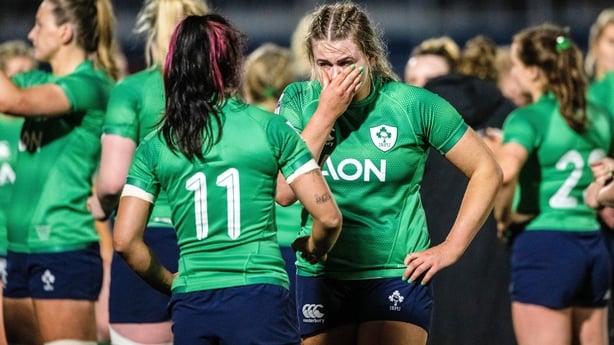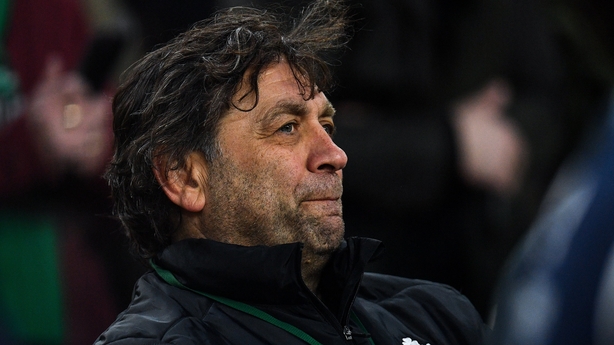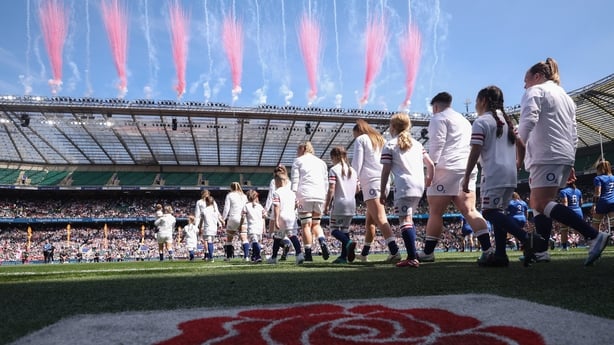Just over four hours separated the full time whistles in Dublin and Edinburgh on Saturday, on an afternoon of wildly contrasting emotions for Irish rugby.
At the Aviva Stadium, Leinster demolished Toulouse with their usual ruthless efficiency to book their place in the final of the Heineken Champions Cup for the fourth time in six years, the latest great day in a year that's already had several of them in the Irish men’s game.
Later that evening in the shadows of Murrayfield, the women’s game fell to a new low, something we didn’t think was possible after the World Cup qualification disaster of 2021. A first Six Nations wooden spoon since 2004 is enough to reconsider that though.
This was meant to be "Year 1" of the fightback. Professional contracts, the recruitment of an experienced senior coach in John McKee, an expansion of the support staff and the commitment to creating provincial centres of excellence have brought the IRFU’s annual spend on the women’s game to above €5.5m.
Those big headlines and exciting numbers all came before the Six Nations though, a championship that has seen Ireland’s senior team disconnected further from the pack, while the expected departure of head coach Greg McWilliams after less than 18 months in charge means that next year we’ll be doing "Year 1" all over again.
Aside from a brave second half showing against champions England, Ireland’s inexperience at this level was woefully exposed, and it’s hard to see that gap bridged by a change in the coaching team.

Even with a record of just three wins from 12 games, it’s hard to pin much of the blame for Ireland’s disastrous campaign on McWilliams. The lack of access to any of Ireland’s Sevens players left him with one hand tied behind his back this season, leading to a starting backline against Wales for Ireland’s opener in which four separate players had fewer than five Test caps each.
As we’ve come to expect in recent years, a women’s international window has also been played out beneath a cloud of off-field issues. First came the news that Ireland’s Sevens stars wouldn’t be supplemented into the XV’s side, followed by a damaging report in the Telegraph which led to McWilliams having to deny accusations of sexism against the union. The confiscation of leaflets with the hashtag #IGiveAF*** before the final home game against England in Cork did little to ease tension.
To rub salt in the self-inflicted wounds, just hours after Ireland’s defeat to Scotland, Cliodhna Moloney scored two tries and was Player of the Match for Exeter as they won the Allianz Cup final against Saracens on Sunday afternoon. The hooker has been in Test rugby exile since the end of 2021, having publicly criticised former women’s rugby director Anthony Eddy.
The value of the IRFU’s contracts for XV’s players (which range from €15,000-€30,000 before potential bonuses) as well as the lack of hybrid contracts for those not in a position to put their careers on hold, have also been criticised in recent months, but those contracts are worth little to anybody unless the competition structures in Ireland do more to prepare players for Test rugby.
This season saw the All Ireland League played to a sprint finish before Christmas, leading into a three-week Interprovincial championship before the inaugural Celtic Challenge in which a Combined Provinces XV strolled to wins against development sides from Scotland and Wales.

Speaking in October, IRFU Performance Director David Nucifora (above) envisaged the Interpros, as well as an expanded Celtic Challenge being the main elite competitions for Ireland’s international players.
"You’ll have a Celtic Cup, growing in size, whether there is an Interprovincial competition somewhere, we have to make sure that game gets taken out of participation and into performance," he said,
"The Celtic Cup will lead into a Women’s Six Nations. The AIL’s role will be to house those developing players coming through and give them competition. I can’t see the Women’s AIL being what the English Premiership is, that’s not our model, that is not going to work here. We have to do it differently."
While the idea of the Celtic Challenge was sound at the time, the reality is that even an expanded version will do little to serve as an elite competition.
With so many of the Welsh and Scottish squads based in the Premier 15s in England, it’s unlikely to provide the quality of opposition which would bring Ireland’s home-based players close to Test level, and ultimately serves little to no purpose.
Women’s rugby - and women’s sport as a whole - in England is having its moment in the sun as attendances and interest rocket, with a record crowd of 58,498 at last Saturday’s Grand Slam decider between the English and French at Twickenham (below).

While the AIL in Ireland gets diluted to the status of a development league, the already superior Premier 15s is likely to get bigger and better, and the IRFU need to make it their top priority to get in on the action, before it's too late.
The IRFU could multiply wages five or ten times over, but unless they have a meaningful club or provincial competition to play in regularly, it won't make them better rugby players.
The trajectory of the XVs game globally is also worth noting. Several years ago, there was some merit in taking a Sevens-first approach, but with the Six Nations moving into its own window away from the men's championship and the resulting attendances and TV figures rising, the funneling of Ireland’s most exciting talents to the shorter form of the game seems short-sighted.
In Beibhinn Parsons, Irish rugby have a potential global superstar and one of the most recognisable and marketable players in the country, but the bulk of her rugby is played on the other side of the world and often at awkward times for an Irish audience. Her two AIL games for Blackrock, in which she scored seven tries, were the only two games she’ll play in the country this season.
By next week, even Bruce Springsteen will have had more time on an Irish rugby pitch.


